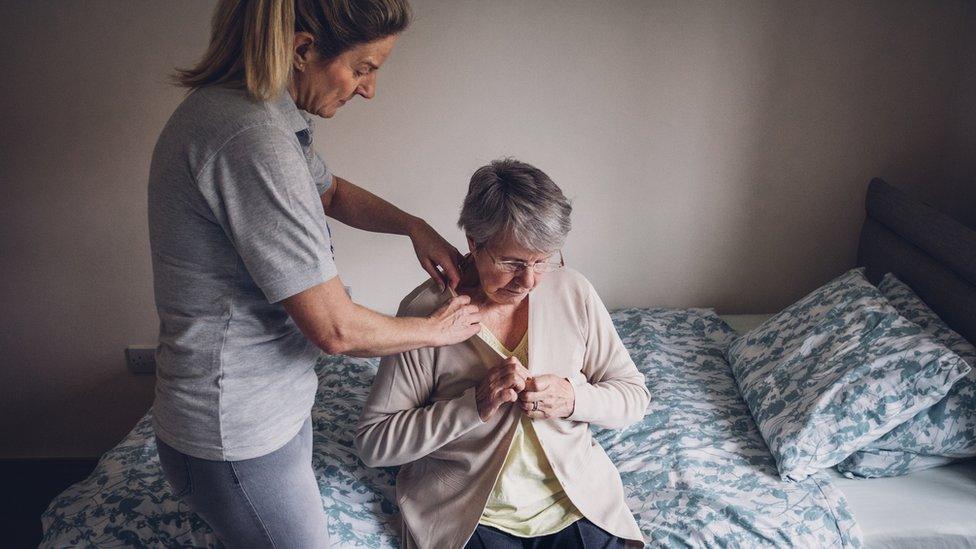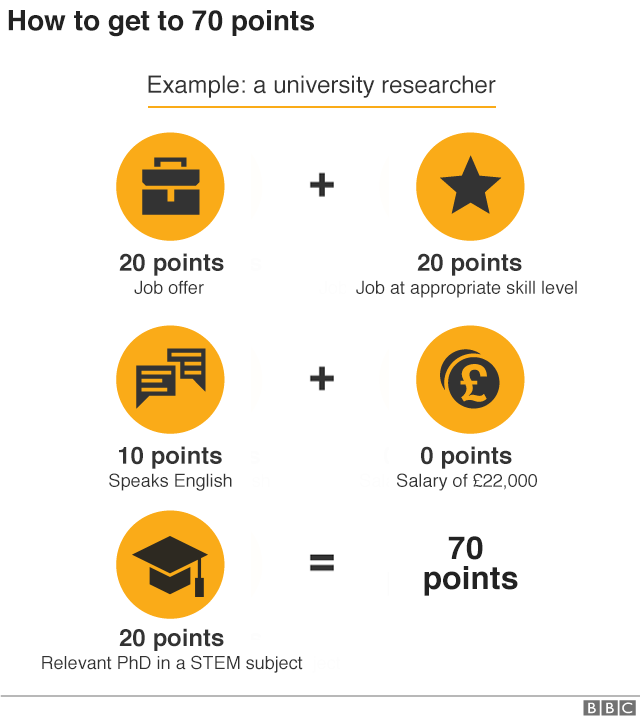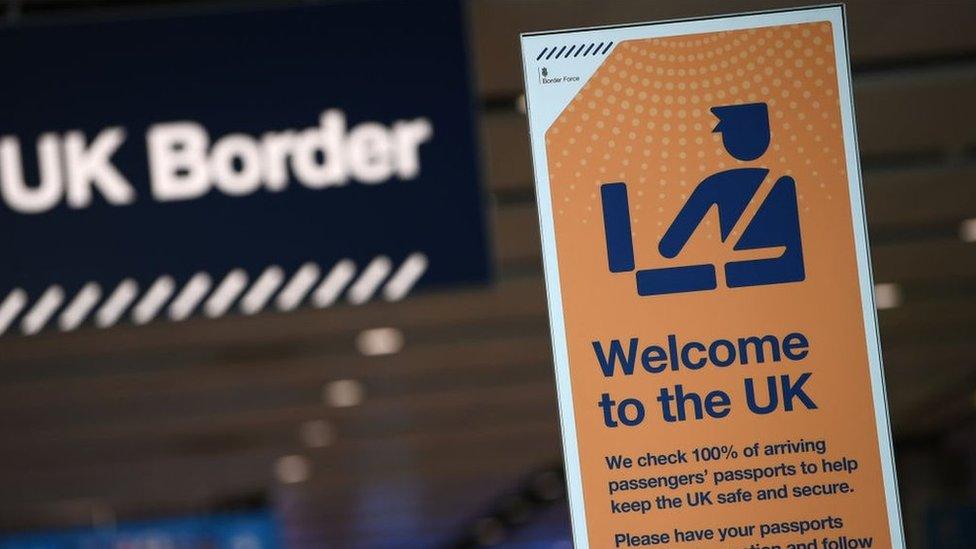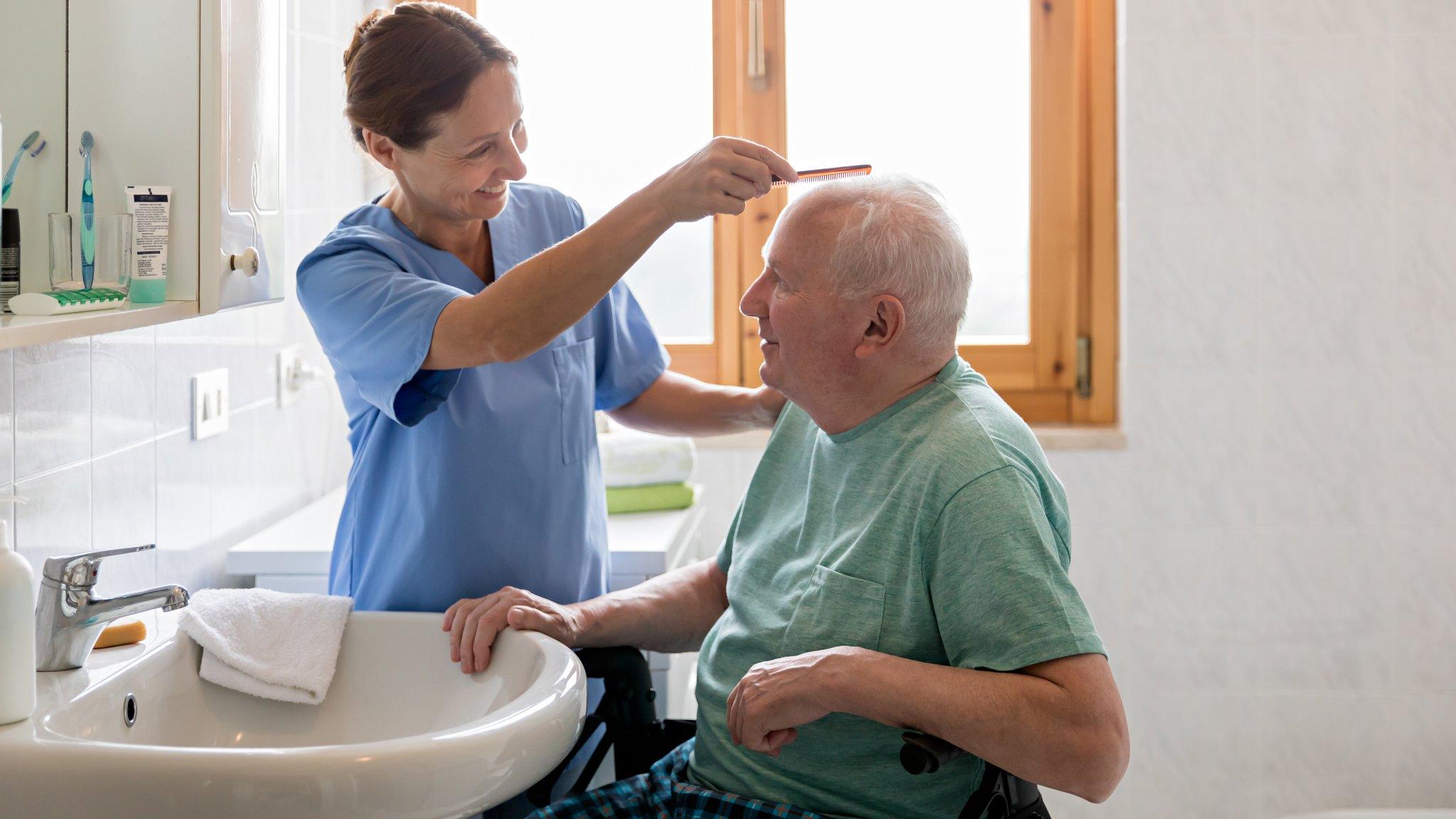What's a skilled worker? And other immigration questions
- Published

The government has been unveiling details of its plans for a new post-Brexit immigration system. It said low-skilled workers would not be given visas, and employers should "move away" from relying on "cheap labour" from Europe. We answer readers' questions on visas, skills, entrepreneurs, and more.
How will the new rules affect overseas workers already in the UK if they lose their current job after 2021? - Dave Platt, Broseley, Shropshire
Workers from the EU already in the UK should apply to the EU Settlement Scheme, external. If they are successful, they will be able to remain in the UK after 30 June 2021 and claim the same benefits as UK citizens if they become unemployed.
Irish citizens do not need to apply to the scheme. The UK and Ireland are both part of a Common Travel Area, external. Irish nationals have a special status in UK law which is separate to and pre-dates their rights as EU citizens.
Different rules apply to workers from outside the EU, and EU migrants arriving after the end of the transition period. Those who lose their job will have to return to their home country, unless they have indefinite leave to remain.
The Home Office rules about which workers can remain in the UK after losing a job are complex but can be read here, external.
What is the situation for lower-skilled EU workers already in the UK, eg care workers? - Diane Hammond, Horam, East Sussex
All EU citizens currently living in the UK will have to apply to the EU Settlement Scheme, external by 30 June 2021 in order to be allowed to stay in the country.
Successful applicants to the scheme - which also affects citizens of Iceland, Liechtenstein, Norway and Switzerland - will be given either settled or pre-settled status.
This will give EU citizens the same access to health care and education after Britain leaves the EU.
Home Secretary Priti Patel: No more routes for cheap, low-skilled labour
Anyone who fails to apply by the deadline will no longer be living in the country legally.
Lower-skilled workers from elsewhere in the world will already be on visas. Once they run out, they would have to reapply under whatever new rules are in force.
How do you define skilled? There are highly skilled workers in the building trade who have no qualifications. - Chris, Haddenham, Bucks
The government says it will define skilled workers as those doing jobs that require A-levels, Scottish Highers or technical equivalents. This is an expansion of the current definition (applying at the moment only to non-EU migrants) which only includes graduates.
Certain types of farm worker, and those who wait at tables, would not be in the new skilled category, but people with qualifications in things like carpentry, plastering and childminding would. People in industries like construction who have learned their skills on the job, but don't have any qualifications, may not be able to get visas.
The government's post-Brexit immigration plan, external envisages a points-based system. Under this scheme, overseas citizens would have to reach 70 points to be able to work in the UK.
Those with appropriate skills will receive 20 points, as will people with doctoral degrees in Stem subjects - science, technology, engineering and mathematics.

What plans are there for entrepreneurs wanting to set up in the UK? - John, Totnes
There are a number of ways, external that entrepreneurs can secure visas to allow them to set up a business and work in the UK.
For instance, the start-up visa, external is for entrepreneurs from outside the EU, Iceland, Liechtenstein, Norway and Switzerland who have a new, original business idea with potential for growth.

They must be endorsed by either a UK higher education institution or a business organisation with a history of supporting UK entrepreneurs.
The visa runs for two years. It cannot be extended but holders can apply for other types of entrepreneurs' visas.
Here's more about the range of UK visas available to entrepreneurs, external.
Would new EU students be able to work while studying for their UK degree course? - Yacine Benrahal, Glasgow
The rights and status of EU citizens currently living in the UK, including students, will not change until 30 June 2021.
EU students currently studying in the UK are allowed to work.
What happens beyond that date will depend on the outcome of detailed negotiations between the EU and UK.
EU students planning to remain in the UK after 1 January 2021 will need to apply to the EU Settlement Scheme, external.
What about EU workers in the UK who don't apply for the settlement scheme and who don't get 70 points? - Yasmin, Fleet, Hants
There is a difference between the EU Settlement Scheme and the points-based immigration system which the government wants to introduce.
All EU citizens currently in the UK will have to register for the EU Settlement Scheme, external if they wish to continue living in the UK after 30 June 2021.

Anyone not applying for the scheme by 30 June 2021 may be at risk of becoming an illegal immigrant.
If their application is successful they will be able to work in the UK after this date, regardless of how many points they would have in the new immigration system.
The points-based system would apply only to those wishing to enter the UK - whether EU or non-EU citizens - after 1 January 2021.
What about lower-skilled UK workers in the EU? - Joe Shingles, London
UK citizens resident in an EU member state, plus Switzerland, Iceland, Lichtenstein and Norway before the transition period ends on 31 December 2020 will be able to continue to live and work there.
But this would only apply only in the EU country where they are resident. It's not yet clear whether they will still be able to work across national borders in the EU.
The final status of UK workers in EU countries will be part of the negotiations between the UK and the EU during the transition period.
UK nationals should register as a resident in the country where they reside.
Different EU countries have their own rules on how to apply for permanent residence.
The UK government website provides country-by-country guides on what to do, external.



What would you like to know about the new immigration laws?
In some cases your question will be published, displaying your name, age and location as you provide it, unless you state otherwise. Your contact details will never be published. Please ensure you have read our terms & conditions and privacy policy.
Use this form to ask your question:
If you are reading this page and can't see the form you will need to visit the mobile version of the BBC website to submit your question or send them via email to YourQuestions@bbc.co.uk, external. Please include your name, age and location with any question you send in.
- Published19 February 2020

